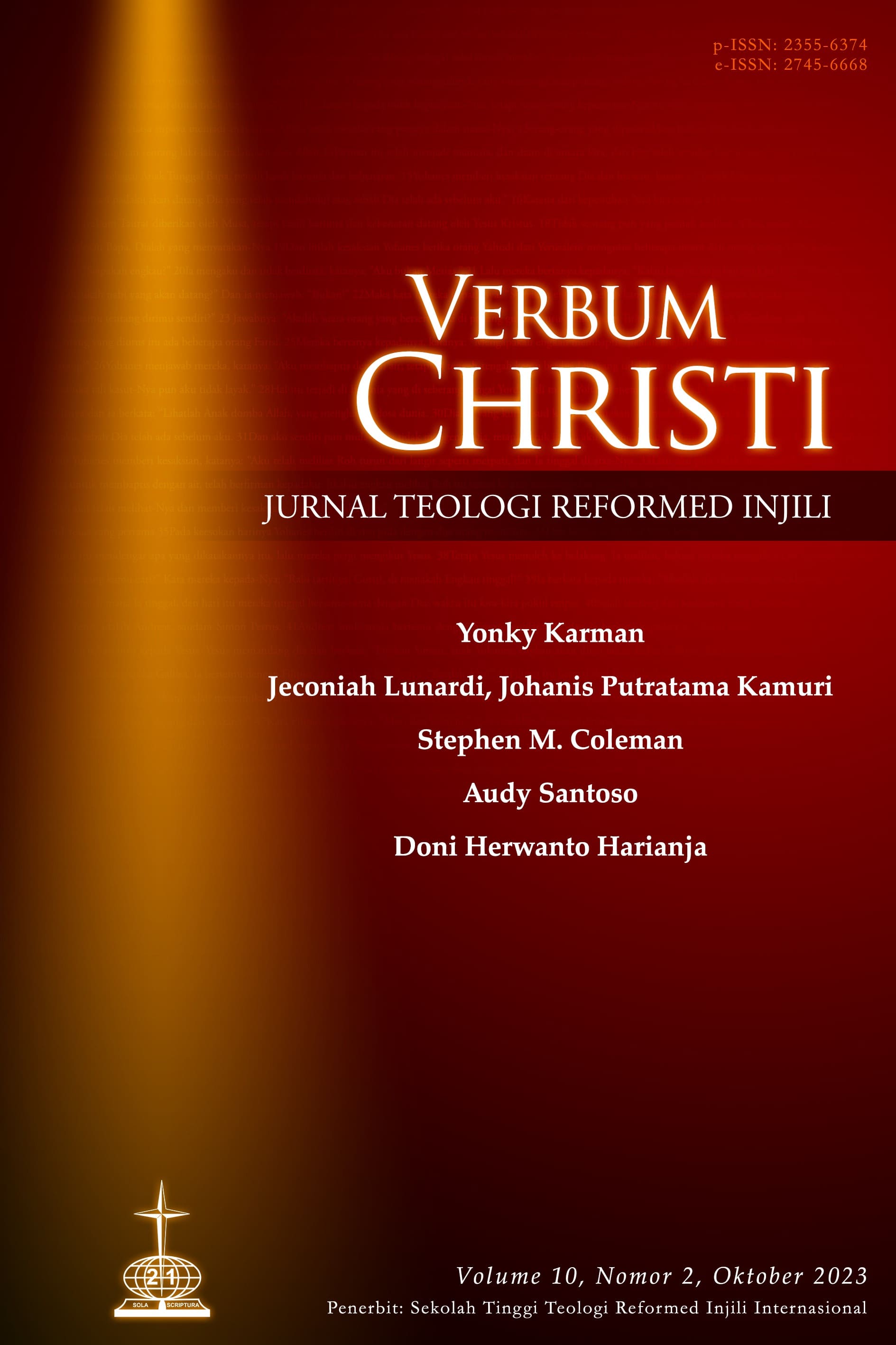Deuteronomy 24:1-4
Divorce Law or Law of Reconciliation?
DOI:
https://doi.org/10.51688/VC10.2.2023.art1Keywords:
Torah, marriage, divorce, casuistic, reunion, patriarchyAbstract
The text of Deuteronomy 24: 1-4 is not as simple as it seems at first glance. It is often read as one, if not the only, divorce law in the Old Testament. Other interpreters read it as a law that protects wives from arbitrary divorce. This article and several other interpreters disagree with these two interpretations. What makes this article different is the use of modern legal discourse. Based on the legal subject and legal relationship, this text prohibits a husband from reuniting with his ex-wife whom he has divorced and who has also remarried to another man and then became a widow again. To interpret the original intent of this law, it would parallelise contemporaneous or more ancient extrabiblical sources, but none are found. Its postbiblical parallels are found in a Jewish legal text and a Quranic text, which confirms the text of Deuteronomy as a prohibition of marriage reunion. It helps us read Deuteronomy's text as a prohibition of (marriage) reunion. This law is for husbands with a strong position in a patriarchal culture so they do not arbitrarily divorce their wives because their regret would be useless.
Downloads
References
Alt, Albrecht. Essays on Old Testament History and Religion. Tr. R. A. Wilson. Oxford: Basil Blackwell, 1966.
André, G. and H. Ringgren. . ṭāmē’. TDOT, V.330-42.
Baab, Otto J. “Divorce.” IDB, I.859.
_____. “Marriage,” IDB, III.278-87.
Badudu, J. S. dan Sutan Mohammad Zain. Kamus Umum Bahasa Indonesia. Jakarta: Pustaka Sinar Harapan, 2001.
Berlin, Adele. “Ki Teitzei 21:10-25:19.” Dalam The Torah: A Women’s Commentary, disunting oleh Tamara Cohn Eskenazi and Andrea L. Weiss, 1165-184. New York: URJ Press and Women of Reform Judaism, 2008.
Blenkinsopp, Joseph. “The Family in First Temple Period,”. Dalam Families in Ancient Israel. The Family, Religion, and Culture, disunting oleh Don S. Browning and Ian S. Evison, 48-103. Louisville: Westminster John Knox, 1997.
Brown, Raymond. The Message of Deuteronomy: Not by Bread Alone. The Bible Speaks Today. Leicester: Inter-Varsity Press, 1993.
Cairns, I. J. Ulangan 2: Fasal 12-34. Tafsiran Alkitab. Jakarta: Gunung Mulia, 1986.
Christensen, Duane L. Deuteronomy 21:10-34:12. Word Biblical Commentary 6B. Nashville: Thomas Nelson, 2002.
Collins, John J. “Marriage, Divorce, and Family in Second Temple Judaism,” 104-62. Dalam Don S. Browning and Ian S. Evison (ed). Families in Ancient Israel. The Family, Religion, and Culture. Louisville: Westminster John Knox, 1997.
Craigie, Peter C. The Book of Deuteronomy. The New International Commentary on the Old Testament. Grand Rapids: Eerdmans, 1987.
Danby, Herbert (tr). The Mishnah: Translated from the Hebrew with Introduction and Brief Explanatory Notes. New York: Oxford University Press, 1983.
Departemen Agama RI. Al Qur’an dan Terjemahnya. Rev. Surabaya: Surya Cipta Aksara, 1993.
Francis Brown, S. R. Driver, and Charles A. Briggs. A Hebrew and English Lexicon of the Old Testament. Repr. with corrections. Oxford: Clarendon, 1953. Atau, BDB.
Gerstenberger, E.. t‘b. THAT, II.1051-55.
Greengus, Samuel. “Law in the OT.” IDBSup, 532-37.
Kaiser, Walter C. Toward Old Testament Ethics. Academie Books. Grand Rapids: Zondervan. 1983.
Karman, Yonky. “Studi Tekstual Maleakhi 2:13-16,” 141-59. Dalam Robert Setio dan Daniel K. Listijabudi (ed), Perceraian di Persimpangan Jalan: Menelisik Perjanjian Lama dan Tradisi Abrahamik. Jakarta: Gunung Mulia, 2015.
Keil, C. F. and F. Delitzsch. The Pentateuch. Commentary on the Old Testament 1. Tr. James Martin. Peabody: Hendrickson, 2001.
Lundbom, Jack R. Deuteronomy: A Commentary. Grand Rapids: Eerdmans, 2013.
Listijabudi, Daniel K. “Perkawinan dalam Kehidupan Israel Alkitab: Tinjauan Sosio-teologis,” 23-45. Dalam Robert Setio dan Daniel K. Listijabudi (ed), Perceraian di Persimpangan Jalan: Menelisik Perjanjian Lama dan Tradisi Abrahamik. Jakarta: Gunung Mulia, 2015.
Maass, F. . ṭm’. THAT, I.664-67.
Marhumah. “Perceraian dalam Konsep Islam: Studi atas Al Qur’an dan Hadis tentang Konsep Perceraian dan Implikasinya terhadap Perempuan dan Anak,” 185-205. Dalam Robert Setio dan Daniel K. Listijabudi (ed), Perceraian di Persimpangan Jalan: Menelisik Perjanjian Lama dan Tradisi Abrahamik. Jakarta: Gunung Mulia, 2015.
Matthews, Victor H. and Don C. Benjamin. Old Testament Parallels: Laws and Stories from the Ancient Near East. New York/Mahwah: Paulist, 1991.
Mayes, A. D. H. Deuteronomy. The New Century Bible Commentary. Grand Rapids: Eerdmans, 1991.
Miller, Patrick D. Deuteronomy. Interpretation. A Bible Commentary for Teaching and Preaching. Louisville: John Knox, 1990.
Morris, Leon. The Gospel According to Matthew. A Pillar Commentary. Grand Rapids: Eerdmans, 1992.
Morrow, William S. An Introduction to Biblical Law. Grand Rapids: Eerdmans, 2017.
Nelson, Richard D. Deuteronomy. The Old Testament Library. Louisville: Westminster John Knox, 2004.
Niehr, H. . ‘ārā. TDOT, XI.343-49.
Olson, Dennis T. Deuteronomy and the Death of Moses: A Theological Reading. Overtures to Biblical Theology. Minneapolis: Fortress, 1994.
Patrick, Dale. Old Testament Law. Atlanta: John Knox, 1985.
Perdue, Leo G. “The Israelite and Early Jewish Family: Summary and Conclusions,” 162-222. Dalam Don S. Browning and Ian S. Evison (ed). Families in Ancient Israel. The Family, Religion, and Culture. Louisville: Westminster John Knox, 1997.
Poerwadarminta, W. J. S. Kamus Umum Bahasa Indonesia. Diolah kembali oleh Pusat Pembinaan dan Pengembangan Bahasa Departemen Pendidikan dan Kebudayaan. Jakarta: Balai Pustaka, 1986.
Preuss, H. D. . to‘ēbā. TDOT, XV.591-604.
von Rad, Gerhard. Deuteronomy. The Old Testament Library. Tr. Dorothea Barton. Philadelphia: Westminster, 1966.
Shapiro, Marc. “Commandments, 613.” ODJR, 167-68.
Shihab, M. Quraish. Tafsir Al-Misbāh: Pesan, Kesan dan Keserasian Al Qur’an. Volume 1: Surah Al-Fatihah, Surah Al-Baqarah. Ciputat: Lentera Hati, 2000.
Spurgeon, Andrew B. “The Covenantal Protection of the Innocent: Deuteronomy 24:1-4.” Journal of Asian Evangelical Theology 24:1 (2020), 21-40.
Tigay, Jeffrey H. Deuteronomy. The Jewish Publication Society Torah Commentary. Philadelphia: The Jewish Publication Society, 1996.
Werblowsky, R. J. Zwi and Geoffrey Wigoder. “Divorce.” ODJR, 203-5.
Downloads
Published
How to Cite
Issue
Section
License
This article follows the terms of Creative Commons Attribution-NonCommercial 4.0 International License.
Copyright (c) 2023 Verbum Christi: Journal of Reformed Evangelical Theology. It is held by the journal with the author's consent.




